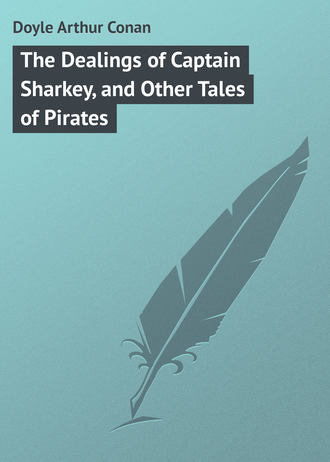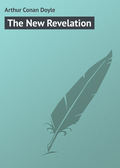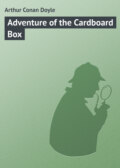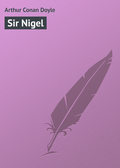
Артур Конан Дойл
The Dealings of Captain Sharkey, and Other Tales of Pirates
"If the paper said that they were unique, Mr. Barclay, then they may be worth anything that you like to name. You wouldn't believe the sums that the rich collectors give. A thousand pounds is nothing to them. We'll have something to show for our voyage, or I am mistaken."
"I don't think that," said I. "As far as I can see they are not very different from any other South American curios."
"Well, sir, I've traded there for fourteen voyages, and I have never seen anything like that chest before. That's worth a pile of money, just as it stands. But it's so heavy, that surely there must be something valuable inside it. Don't you think we ought to open it and see?"
"If you break it open you will spoil it, as likely as not," said the second mate.
Armstrong squatted down in front of it, with his head on one side, and his long, thin nose within a few inches of the lock.
"The wood is oak," said he, "and it has shrunk a little with age. If I had a chisel or a strong-bladed knife I could force the lock back without doing any damage at all."
The mention of a strong-bladed knife made me think of the dead seaman upon the brig.
"I wonder if he could have been on the job when some one came to interfere with him," said I.
"I don't know about that, sir, but I am perfectly certain that I could open the box. There's a screwdriver here in the locker. Just hold the lamp, Allardyce, and I'll have it done in a brace of shakes."
"Wait a bit," said I, for already, with eyes which gleamed with curiosity and with avarice, he was stooping over the lid. "I don't see that there is any hurry over this matter. You've read that card which warns us not to open it. It may mean anything or it may mean nothing, but somehow I feel inclined to obey it. After all, whatever is in it will keep, and if it is valuable it will be worth as much if it is opened in the owner's offices as in the cabin of the Mary Sinclair."
The first officer seemed bitterly disappointed at my decision.
"Surely, sir, you are not superstitious about it," said he, with a slight sneer upon his thin lips. "If it gets out of our own hands, and we don't see for ourselves what is inside it, we may be done out of our rights; besides – "
"That's enough, Mr. Armstrong," said I, abruptly. "You may have every confidence that you will get your rights, but I will not have that box opened to-night."
"Why, the label itself shows that the box has been examined by Europeans," Allardyce added. "Because a box is a treasure-box is no reason that it has treasures inside it now. A good many folk have had a peep into it since the days of the old Governor of Terra Firma."
Armstrong threw the screwdriver down upon the table and shrugged his shoulders.
"Just as you like," said he; but for the rest of the evening, although we spoke upon many subjects, I noticed that his eyes were continually coming round, with the same expression of curiosity and greed, to the old striped box.
And now I come to that portion of my story which fills me even now with a shuddering horror when I think of it. The main cabin had the rooms of the officers round it, but mine was the farthest away from it at the end of the little passage which led to the companion. No regular watch was kept by me, except in cases of emergency, and the three mates divided the watches among them. Armstrong had the middle watch, which ends at four in the morning, and he was relieved by Allardyce. For my part I have always been one of the soundest of sleepers, and it is rare for anything less than a hand upon my shoulder to arouse me.
And yet I was aroused that night, or rather in the early grey of the morning. It was just half-past four by my chronometer when something caused me to sit up in my berth wide awake and with every nerve tingling. It was a sound of some sort, a crash with a human cry at the end of it, which still jarred upon my ears. I sat listening, but all was now silent. And yet it could not have been imagination, that hideous cry, for the echo of it still rang in my head, and it seemed to have come from some place quite close to me. I sprang from my bunk, and, pulling on some clothes, I made my way into the cabin.
At first I saw nothing unusual there. In the cold, grey light I made out the red-clothed table, the six rotating chairs, the walnut lockers, the swinging barometer, and there, at the end, the big striped chest. I was turning away with the intention of going upon deck and asking the second mate if he had heard anything, when my eyes fell suddenly upon something which projected from under the table. It was the leg of a man – a leg with a long sea-boot upon it. I stooped, and there was a figure sprawling upon his face, his arms thrown forward and his body twisted. One glance told me that it was Armstrong, the first officer, and a second that he was a dead man. For a few moments I stood gasping. Then I rushed on to the deck, called Allardyce to my assistance, and came back with him into the cabin.
Together we pulled the unfortunate fellow from under the table, and as we looked at his dripping head, we exchanged glances, and I do not know which was the paler of the two.
"The same as the Spanish sailor," said I.
"The very same. God preserve us! It's that infernal chest! Look at Armstrong's hand!"
He held up the mate's right hand, and there was the screwdriver which he had wished to use the night before.
"He's been at the chest, sir. He knew that I was on deck and you asleep. He knelt down in front of it, and he pushed the lock back with that tool. Then something happened to him, and he cried out so that you heard him."
"Allardyce," I whispered, "what could have happened to him?"
The second mate put his hand upon my sleeve and drew me into his cabin.
"We can talk here, sir, and we don't know who may be listening to us in there. What do you suppose is in that box, Captain Barclay?"
"I give you my word, Allardyce, that I have no idea."
"Well, I can only find one theory which will fit all the facts. Look at the size of the box. Look at all the carving and metal-work which may conceal any number of holes. Look at the weight of it; it took four men to carry it. On the top of that, remember that two men have tried to open it, and both have come to their end through it. Now, sir, what can it mean except one thing?"
"You mean there is a man in it?"
"Of course there is a man in it. You know how it is in these South American States, sir. A man may be President one week and hunted like a dog the next. They are for ever flying for their lives. My idea is that there is some fellow in hiding there, who is armed and desperate, and who will fight to the death before he is taken."
"But his food and drink?"
"It's a roomy chest, sir, and he may have some provisions stowed away. As to his drink, he had a friend among the crew upon the brig who saw that he had what he needed."
"You think, then, that the label asking people not to open the box was simply written in his interest?"
"Yes, sir, that is my idea. Have you any other way of explaining the facts?"
I had to confess that I had not.
"The question is what are we to do?" I asked.
"The man's a dangerous ruffian who sticks at nothing. I'm thinking it wouldn't be a bad thing to put a rope round the chest and tow it alongside for half an hour; then we could open it at our ease. Or if we just tied the box up and kept him from getting any water maybe that would do as well. Or the carpenter could put a coat of varnish over it and stop all the blowholes."
"Come, Allardyce," said I, angrily. "You don't seriously mean to say that a whole ship's company are going to be terrorised by a single man in a box. If he's there I'll engage to fetch him out!" I went to my room and came back with my revolver in my hand. "Now, Allardyce," said I. "Do you open the lock, and I'll stand on guard."
"For God's sake, think what you are doing, sir," cried the mate. "Two men have lost their lives over it, and the blood of one not yet dry upon the carpet."
"The more reason why we should revenge him."
"Well, sir, at least let me call the carpenter. Three are better than two, and he is a good stout man."
He went off in search of him, and I was left alone with the striped chest in the cabin. I don't think that I'm a nervous man, but I kept the table between me and this solid old relic of the Spanish Main. In the growing light of morning the red and white striping was beginning to appear, and the curious scrolls and wreaths of metal and carving which showed the loving pains which cunning craftsmen had expended upon it. Presently the carpenter and the mate came back together, the former with a hammer in his hand.
"It's a bad business, this, sir," said he, shaking his head, as he looked at the body of the mate. "And you think there's someone hiding in the box?"
"There's no doubt about it," said Allardyce, picking up the screwdriver and setting his jaw like a man who needs to brace his courage. "I'll drive the lock back if you will both stand by. If he rises let him have it on the head with your hammer, carpenter! Shoot at once, sir, if he raises his hand. Now!"
He had knelt down in front of the striped chest, and passed the blade of the tool under the lid. With a sharp snick the lock flew back. "Stand by!" yelled the mate, and with a heave he threw open the massive top of the box. As it swung up, we all three sprang back, I with my pistol levelled, and the carpenter with the hammer above his head. Then, as nothing happened, we each took a step forward and peeped in. The box was empty.
Not quite empty either, for in one corner was lying an old yellow candlestick, elaborately engraved, which appeared to be as old as the box itself. Its rich yellow tone and artistic shape suggested that it was an object of value. For the rest there was nothing more weighty or valuable than dust in the old striped treasure-chest.
"Well, I'm blessed!" cried Allardyce, staring blankly into it. "Where does the weight come in, then?"
"Look at the thickness of the sides and look at the lid. Why, it's five inches through. And see that great metal spring across it."
"That's for holding the lid up," said the mate. "You see, it won't lean back. What's that German printing on the inside?"
"It means that it was made by Johann Rothstein of Augsburg, in 1606."
"And a solid bit of work, too. But it doesn't throw much light on what has passed, does it, Captain Barclay? That candlestick looks like gold. We shall have something for our trouble after all."
He leant forward to grasp it, and from that moment I have never doubted as to the reality of inspiration, for on the instant I caught him by the collar and pulled him straight again. It may have been some story of the Middle Ages which had come back to my mind, or it may have been that my eye had caught some red which was not that of rust upon the upper part of the lock, but to him and to me it will always seem an inspiration, so prompt and sudden was my action.
"There's devilry here," said I. "Give me the crooked stick from the corner."
It was an ordinary walking-cane with a hooked top. I passed it over the candlestick and gave it a pull. With a flash a row of polished steel fangs shot out from below the upper lip, and the great striped chest snapped at us like a wild animal. Clang came the huge lid into its place, and the glasses on the swinging rack sang and tinkled with the shock. The mate sat down on the edge of the table, and shivered like a frightened horse.
"You've saved my life, Captain Barclay!" said he.
So this was the secret of the striped treasure-chest of old Don Ramirez di Leyra, and this was how he preserved his ill-gotten gains from the Terra Firma and the Province of Veraquas. Be the thief ever so cunning he could not tell that golden candlestick from the other articles of value, and the instant that he laid hand upon it the terrible spring was unloosed and the murderous steel spikes were driven into his brain, while the shock of the blow sent the victim backwards and enabled the chest to automatically close itself. How many, I wondered, had fallen victims to the ingenuity of the Mechanic of Augsburg. And as I thought of the possible history of that grim striped chest my resolution was very quickly taken.
"Carpenter, bring three men and carry this on deck."
"Going to throw it overboard, sir?"
"Yes, Mr. Allardyce. I'm not superstitious as a rule, but there are some things which are more than a sailor can be called upon to stand."
"No wonder that brig made heavy weather, Captain Barclay, with such a thing on board. The glass is dropping fast, sir, and we are only just in time."
So we did not even wait for the three sailors, but we carried it out, the mate, the carpenter, and I, and we pushed it with our own hands over the bulwarks. There was a white spout of water, and it was gone. There it lies, the striped chest, a thousand fathoms deep, and if, as they say, the sea will some day be dry land, I grieve for the man who finds that old box and tries to penetrate into its secret.
VIII
THE CAPTAIN OF THE "POLESTAR"
(BEING AN EXTRACT FROM THE SINGULAR JOURNAL OF JOHN M'ALISTER RAY, STUDENT OF MEDICINE.)
September 11th.– Lat. 81° 40' N.; long. 2° E. Still lying-to amid enormous ice fields. The one which stretches away to the north of us, and to which our ice-anchor is attached, cannot be smaller than an English county. To the right and left unbroken sheets extend to the horizon. This morning the mate reported that there were signs of pack ice to the southward. Should this form of sufficient thickness to bar our return, we shall be in a position of danger, as the food, I hear, is already running somewhat short. It is late in the season, and the nights are beginning to reappear. This morning I saw a star twinkling just over the fore-yard, the first since the beginning of May. There is considerable discontent among the crew, many of whom are anxious to get back home to be in time for the herring season, when labour always commands a high price upon the Scotch coast. As yet their displeasure is only signified by sullen countenances and black looks, but I heard from the second mate this afternoon that they contemplated sending a deputation to the Captain to explain their grievance. I much doubt how he will receive it, as he is a man of fierce temper, and very sensitive about anything approaching to an infringement of his rights. I shall venture after dinner to say a few words to him upon the subject. I have always found that he will tolerate from me what he would resent from any other member of the crew. Amsterdam Island, at the north-west corner of Spitzbergen, is visible upon our starboard quarter – a rugged line of volcanic rocks, intersected by white seams, which represent glaciers. It is curious to think that at the present moment there is probably no human being nearer to us than the Danish settlements in the south of Greenland – a good nine hundred miles as the crow flies. A captain takes a great responsibility upon himself when he risks his vessel under such circumstances. No whaler has ever remained in these latitudes till so advanced a period of the year.
9 P.M. – I have spoken to Captain Craigie, and though the result has been hardly satisfactory, I am bound to say that he listened to what I had to say very quietly and even deferentially. When I had finished he put on that air of iron determination which I have frequently observed upon his face, and paced rapidly backwards and forwards across the narrow cabin for some minutes. At first I feared that I had seriously offended him, but he dispelled the idea by sitting down again, and putting his hand upon my arm with a gesture which almost amounted to a caress. There was a depth of tenderness too in his wild dark eyes which surprised me considerably. "Look here, Doctor," he said, "I'm sorry I ever took you – I am indeed – and I would give fifty pounds this minute to see you standing safe upon the Dundee quay. It's hit or miss with me this time. There are fish to the north of us. How dare you shake your head, sir, when I tell you I saw them blowing from the mast-head?" – this in a sudden burst of fury, though I was not conscious of having shown any signs of doubt. "Two-and-twenty fish in as many minutes as I am a living man, and not one under ten foot.1 Now, doctor, do you think I can leave the country when there is only one infernal strip of ice between me and my fortune? If it came on to blow from the north to-morrow we could fill the ship and be away before the frost could catch us. If it came on to blow from the south – well, I suppose the men are paid for risking their lives, and as for myself it matters but little to me, for I have more to bind me to the other world than to this one. I confess that I am sorry for you, though. I wish I had old Angus Tait who was with me last voyage, for he was a man that would never be missed, and you – you said once that you were engaged, did you not?"
"Yes," I answered, snapping the spring of the locket which hung from my watch-chain, and holding up the little vignette of Flora.
"Curse you!" he yelled, springing out of his seat, with his very beard bristling with passion. "What is your happiness to me? What have I to do with her that you must dangle her photograph before my eyes?" I almost thought that he was about to strike me in the frenzy of his rage, but with another imprecation he dashed open the door of the cabin and rushed out upon deck, leaving me considerably astonished at his extraordinary violence. It is the first time that he has ever shown me anything but courtesy and kindness. I can hear him pacing excitedly up and down overhead as I write these lines.
I should like to give a sketch of the character of this man, but it seems presumptuous to attempt such a thing upon paper, when the idea in my own mind is at best a vague and uncertain one. Several times I have thought that I grasped the clue which might explain it, but only to be disappointed by his presenting himself in some new light which would upset all my conclusions. It may be that no human eye but my own shall ever rest upon these lines, yet as a psychological study I shall attempt to leave some record of Captain Nicholas Craigie.
A man's outer case generally gives some indication of the soul within. The Captain is tall and well-formed, with dark, handsome face, and a curious way of twitching his limbs, which may arise from nervousness, or be simply an outcome of his excessive energy. His jaw and whole cast of countenance is manly and resolute, but the eyes are the distinctive feature of his face. They are of the very darkest hazel, bright and eager, with a singular mixture of recklessness in their expression, and of something else which I have sometimes thought was more allied with horror than any other emotion. Generally the former predominated, but on occasions, and more particularly when he was thoughtfully inclined, the look of fear would spread and deepen until it imparted a new character to his whole countenance. It is at these times that he is most subject to tempestuous fits of anger, and he seems to be aware of it, for I have known him lock himself up so that no one might approach him until his dark hour was passed. He sleeps badly, and I have heard him shouting during the night, but his cabin is some little distance from mine, and I could never distinguish the words which he said.
This is one phase of his character, and the most disagreeable one. It is only through my close association with him, thrown together as we are day after day, that I have observed it. Otherwise he is an agreeable companion, well-read and entertaining, and as gallant a seaman as ever trod a deck. I shall not easily forget the way in which he handled the ship when we were caught by a gale among the loose ice at the beginning of April. I have never seen him so cheerful, and even hilarious, as he was that night, as he paced backwards and forwards upon the bridge amid the flashing of the lightning and the howling of the wind. He has told me several times that the thought of death was a pleasant one to him, which is a sad thing for a young man to say; he cannot be much more than thirty, though his hair and moustache are already slightly grizzled. Some great sorrow must have overtaken him and blighted his whole life. Perhaps I should be the same if I lost my Flora – God knows! I think if it were not for her that I should care very little whether the wind blew from the north or the south to-morrow. There, I hear him come down the companion, and he has locked himself up in his room, which shows that he is still in an unamiable mood. And so to bed, as old Pepys would say, for the candle is burning down (we have to use them now since the nights are closing in), and the steward has turned in, so there are no hopes of another one.
September 12th.– Calm, clear day, and still lying in the same position. What wind there is comes from the south-east, but it is very slight. Captain is in a better humour, and apologised to me at breakfast for his rudeness. He still looks somewhat distrait, however, and retains that wild look in his eyes which in a Highlander would mean that he was "fey" – at least so our chief engineer remarked to me, and he has some reputation among the Celtic portion of our crew as a seer and expounder of omens.
It is strange that superstition should have obtained such mastery over this hard-headed and practical race. I could not have believed to what an extent it is carried had I not observed it for myself. We have had a perfect epidemic of it this voyage, until I have felt inclined to serve out rations of sedatives and nerve-tonics with the Saturday allowance of grog. The first symptom of it was that shortly after leaving Shetland the men at the wheel used to complain that they heard plaintive cries and screams in the wake of the ship, as if something were following it and were unable to overtake it. This fiction has been kept up during the whole voyage, and on dark nights at the beginning of the seal-fishing it was only with great difficulty that men could be induced to do their spell. No doubt what they heard was either the creaking of the rudder-chains, or the cry of some passing sea-bird. I have been fetched out of bed several times to listen to it, but I need hardly say that I was never able to distinguish anything unnatural. The men, however, are so absurdly positive upon the subject that it is hopeless to argue with them. I mentioned the matter to the Captain once, but to my surprise he took it very gravely, and indeed appeared to be considerably disturbed by what I told him. I should have thought that he at least would have been above such vulgar delusions.
All this disquisition upon superstition leads me up to the fact that Mr. Manson, our second mate, saw a ghost last night – or, at least, says that he did, which of course is the same thing. It is quite refreshing to have some new topic of conversation after the eternal routine of bears and whales which has served us for so many months. Manson swears the ship is haunted, and that he would not stay in her a day if he had any other place to go to. Indeed the fellow is honestly frightened, and I had to give him some chloral and bromide of potassium this morning to steady him down. He seemed quite indignant when I suggested that he had been having an extra glass the night before, and I was obliged to pacify him by keeping as grave a countenance as possible during his story, which he certainly narrated in a very straightforward and matter-of-fact way.
"I was on the bridge," he said, "about four bells in the middle watch, just when the night was at its darkest. There was a bit of a moon, but the clouds were blowing across it so that you couldn't see far from the ship. John M'Leod, the harpooner, came aft from the fo'c'sle-head and reported a strange noise on the starboard bow. I went forrard and we both heard it, sometimes like a bairn crying and sometimes like a wench in pain. I've been seventeen years to the country and I never heard seal, old or young, make a sound like that. As we were standing there on the fo'c'sle-head the moon came out from behind a cloud, and we both saw a sort of white figure moving across the ice field in the same direction that we had heard the cries. We lost sight of it for a while, but it came back on the port bow, and we could just make it out like a shadow on the ice. I sent a hand aft for the rifles, and M'Leod and I went down on to the pack, thinking that maybe it might be a bear. When we got on the ice I lost sight of M'Leod, but I pushed on in the direction where I could still hear the cries. I followed them for a mile or maybe more, and then running round a hummock I came right on to the top of it standing and waiting for me seemingly. I don't know what it was. It wasn't a bear, anyway. It was tall and white and straight, and if it wasn't a man nor a woman, I'll stake my davy it was something worse. I made for the ship as hard as I could run, and precious glad I was to find myself aboard. I signed articles to do my duty by the ship, and on the ship I'll stay, but you don't catch me on the ice again after sundown."
That is his story, given as far as I can in his own words. I fancy what he saw must, in spite of his denial, have been a young bear erect upon its hind legs, an attitude which they often assume when alarmed. In the uncertain light this would bear a resemblance to a human figure, especially to a man whose nerves were already somewhat shaken. Whatever it may have been, the occurrence is unfortunate, for it has produced a most unpleasant effect upon the crew. Their looks are more sullen than before, and their discontent more open. The double grievance of being debarred from the herring fishing and of being detained in what they choose to call a haunted vessel, may lead them to do something rash. Even the harpooners, who are the oldest and steadiest among them, are joining in the general agitation.
Apart from this absurd outbreak of superstition, things are looking rather more cheerful. The pack which was forming to the south of us has partly cleared away, and the water is so warm as to lead me to believe that we are lying in one of those branches of the gulf-stream which run up between Greenland and Spitzbergen. There are numerous small Medusæ and sealemons about the ship, with abundance of shrimps, so that there is every possibility of "fish" being sighted. Indeed one was seen blowing about dinner-time, but in such a position that it was impossible for the boats to follow it.
September 13th.– Had an interesting conversation with the chief mate, Mr. Milne, upon the bridge. It seems that our captain is as great an enigma to the seamen, and even to the owners of the vessel, as he has been to me. Mr. Milne tells me that when the ship is paid off, upon returning from a voyage, Captain Craigie disappears, and is not seen again until the approach of another season, when he walks quietly into the office of the company, and asks whether his services will be required. He has no friend in Dundee, nor does any one pretend to be acquainted with his early history. His position depends entirely upon his skill as a seaman, and the name for courage and coolness which he had earned in the capacity of mate, before being entrusted with a separate command. The unanimous opinion seems to be that he is not a Scotchman, and that his name is an assumed one. Mr. Milne thinks that he has devoted himself to whaling simply for the reason that it is the most dangerous occupation which he could select, and that he courts death in every possible manner. He mentioned several instances of this, one of which is rather curious, if true. It seems that on one occasion he did not put in an appearance at the office, and a substitute had to be selected in his place. That was at the time of the last Russian and Turkish War. When he turned up again next spring he had a puckered wound in the side of his neck which he used to endeavor to conceal with his cravat. Whether the mate's inference that he had been engaged in the war is true or not I cannot say. It was certainly a strange coincidence.
The wind is veering round in an easterly direction, but is still very slight. I think the ice is lying closer than it did yesterday. As far as the eye can reach on every side there is one wide expanse of spotless white, only broken by an occasional rift or the dark shadow of a hummock. To the south there is the narrow lane of blue water which is our sole means of escape, and which is closing up every day. The Captain is taking a heavy responsibility upon himself. I hear that the tank of potatoes has been finished, and even the biscuits are running short, but he preserves the same impassable countenance, and spends the greater part of the day at the crow's nest, sweeping the horizon with his glass. His manner is very variable, and he seems to avoid my society, but there has been no repetition of the violence which he showed the other night.
7.30 P.M. – My deliberate opinion is that we are commanded by a madman. Nothing else can account for the extraordinary vagaries of Captain Craigie. It is fortunate that I have kept this journal of our voyage, as it will serve to justify us in case we have to put him under any sort of restraint, a step which I should only consent to as a last resource. Curiously enough it was he himself who suggested lunacy and not mere eccentricity as the secret of his strange conduct. He was standing upon the bridge about an hour ago, peering as usual through his glass, while I was walking up and down the quarter-deck. The majority of the men were below at their tea, for the watches have not been regularly kept of late. Tired of walking, I leaned against the bulwarks, and admired the mellow glow cast by the sinking sun upon the great ice fields which surround us. I was suddenly aroused from the reverie into which I had fallen by a hoarse voice at my elbow, and starting round I found that the Captain had descended and was standing by my side. He was staring out over the ice with an expression in which horror, surprise, and something approaching to joy were contending for the mastery. In spite of the cold, great drops of perspiration were coursing down his forehead, and he was evidently fearfully excited. His limbs twitched like those of a man upon the verge of an epileptic fit, and the lines about his mouth were drawn and hard.







